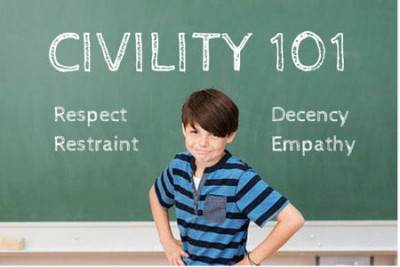
I hear many complaints these days about the younger generation’s lack of civility. And indeed, times have changed. But where do we draw the line when it comes to respectful behavior in children? How do we teach them to live considerately of others?
While driving through Seattle recently, I saw a small group of boys on a neighborhood street corner. They ranged in ages from about 6 to 13. When I rounded the corner, I noticed that the youngest boy was standing on the sidewalk openly relieving himself. He was urinating in broad daylight on a busy street. As I turned my head to see if my eyes were playing tricks on me, a woman in another car was right behind me. She slowed down and stared in disbelief. The boy proceeded to flip her off and yell, “F*** you, lady!” I was dismayed. Where did this boy learn such disrespectful behavior? How had he come to completely disregard basic civility?
Unfortunately, what this woman and I witnessed is just one incident out of the thousands that happen every day. And it makes me wonder – how can we teach our children civility when we live in an F-word society?
What is Civility?
Civility is the behavior that recognizes the humanity of others – a key element of sociability. It is what allows us to live peacefully together in families, neighborhoods, schools, and communities. Civility demands restraint and an ability to put the interests of the common good above self-interests. It requires us to treat others with decency, regardless of our differences. The psychological elements of civility include self-awareness, self-control, empathy, and respect.
Is Civility on the Decline?
It’s impossible to know if civility has declined because it is difficult to measure scientifically. But by all subjective measures, most Americans believe it has severely decreased over the past two decades. We hear stories daily about ridicule, bullying, and simple rudeness – and these stories are happening in homes, classrooms, on the Internet, and even street corners.
There are several reasons for this decline. Some ethics scholars suggest that as society has become more informal, there are no longer agreed-upon rules for respectful behavior. The borders of societal norms have become more broad and fuzzy. Shows like “The Apprentice” and “Survivor” highlight back-stabbing behavior as admirable and winning qualities. And then there’s the Internet. The Internet has produced an etiquette-free zone where people can post anonymous and uncivil criticisms with ease. With anonymity, there is no responsibility. With no responsibility, there is poor judgment. It’s a slippery slope.
Research Links Incivility to Violence and Bullying
Basically, we all, children included, are exposed to rudeness, vulgarity, and violence that would have been unthinkable in previous generations. That isn’t going to change anytime soon. But if we are truly a world turning away from civility, we may be in for tougher times ahead. Studies show that incivility leads to violence, unhealthy communities, and societies paralyzed by conflict and political division. It’s not exactly the kind of world we envision for our kids.
Children model adult behavior on television and in real life. And they replicate language they learn online. It is not uncommon to hear “F*** you” spoken by children just learning to talk. That’s because children are systemically connected to everything around them. The world is their learning environment. We are their teachers. And as parents, teachers, coaches, politicians, television producers, and others who impact children’s lives, we have a responsibility to foster civility in children so they grow up with less, not more violence and ridicule.
A Basic Course in Civility:
15 Ways to Foster Respectful Behavior
Unfortunately, there is no neatly organized curriculum for Civility 101 because civility is learned through respectful relationships. The truth is, we are all teaching a class in civility to children – parents, teachers, youth mentors, and everyone who comes into contact with kids. So what can we do? We can teach kids the foundations of civility every day in the way we communicate with them and others, including the following:
- Think about the impact of words and actions on others before you use them.
- Apologize when you are wrong.
- Set ground rules for civil behavior at home and in classrooms.
- Teach kids how to become engaged citizens.
- Treat children and adults with the respect that you expect from them.
- Demand civility of politicians and public servants.
- Use respectful language when you disagree with someone.
- Don’t let anger and emotion get in the way of listening to others.
- Be tolerant of people who are different from you.
- Teach character strengths, like respect and empathy, at home and in classrooms.
- Challenge people’s views, but don’t attack the person.
- Acknowledge others for their civility and respectful behavior, regardless of their viewpoints.
- Remind kids often why they – and you – should be civil.
- Empower children to take a stand against bullying.
- Lead by example.
Have more ideas and every day practices to add? Please share your thoughts, suggestions, and additions in the comments section.
Image Credit: Racorn
Published: February 23, 2015



